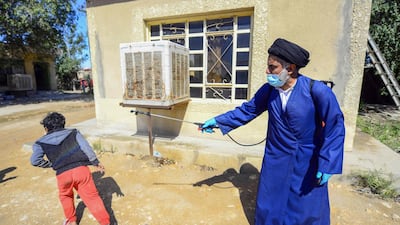The impact of plunging oil prices and acceleration of the coronavirus pandemic on Central Asia and the Middle East has been "substantial" and could intensify, with the fallout set to be equal or worse than the global financial crisis more than a decade ago, as the global economy heads into recession, the International Monetary Fund said.
With three-quarters of countries in the wider region reporting confirmed cases and some facing a major outbreak of Covid-19, the pandemic has become "the largest near-term challenge to the region", Jihad Azour, IMF director of the Middle East and Central Asia department, said on Tuesday.
Challenges stemming from the virus will be especially daunting for the region’s fragile and conflict-torn states – such as Iraq, Sudan and Yemen.
The difficulty of preparing weak health systems for the outbreak in these states could be compounded by reduced imports because of disruptions in global trade, he added.
The pandemic has infected more than 382,000 people worldwide, killed over 16,500, according to Johns Hopkins University, which is tracking global data on the outbreak. More than 101,800 people have recovered.
“Beyond the devastating toll on human health, the pandemic is causing significant economic turmoil in the region through simultaneous shocks – a drop in domestic and external demand, a reduction in trade, disruption of production, a fall in consumer confidence, and tightening of financial conditions,” Mr Azour said.
The region’s oil exporters face the additional shock of plummeting oil prices. The global health scare is forcing countries to close borders and impose lockdowns to stem the spread of infection.
Subsequent travel restrictions have reduced global demand for oil, and the failure of the Opec+ alliance to extend a production cut agreement earlier this month has led to a glut in oil supply.
Oil prices have slumped by about 60 per cent since the start of the public health crisis.
“The intertwined shocks are expected to deal a severe blow to economic activity in the region, at least in the first half of this year, with potentially lasting consequences,” Mr Azour said.
Economic policy responses, Mr Azour said, should be directed at preventing the pandemic — a temporary health crisis — from becoming a protracted economic recession. Governments can achieve this by using a mix of “timely and targeted policies” on hard-hit sectors and populations, including temporary tax relief and cash transfers.
A number of countries in the region, including the UAE and Saudi Arabia have already introduced large financial packages with targeted measures to defer taxes and government fees, as well as offering loan repayment holidays and extended lending to small and medium-sized enterprises.
“When the immediate crisis from the coronavirus has begun to dissipate, consideration could be given to more conventional fiscal measures to support the economy, such as restarting infrastructure spending,” he said.
The coronavirus pandemic has hammered international trade and brought the travel and tourism sector to a halt, putting tens of millions of jobs at risk worldwide. The IMF expects a global recession this year to be “at least as bad as during the global financial crisis or worse”, but predicts growth will recover in 2021.
“To get there, it is paramount to prioritise containment and strengthen health systems —everywhere. The economic impact is and will be severe, but the faster the virus stops, the quicker and stronger the recovery will be,” IMF managing director, Kristalina Georgieva, said in a statement late on Tuesday.
The IMF, along with the World Bank, has led calls for a coordinated global monetary response, similar to the one undertaken during the 2008-09 financial crisis, as major economies falter. Stock markets across the globe have tumbled, losing at least $17 trillion in market value despite massive stimulus packages and coordinated interest rate cuts to stabilise financial markets.
The IMF said it welcomes both fiscal measures and moves of major central banks to ease monetary policy, but “even more will be needed, especially on the fiscal front”.
Earlier this month, the Washington-based lender said it is ready to mobilise its $1tn lending capacity to help nations in need to deal with the outbreak and soften its blow to their economies. The IMF has already made $50 billion available in financing. Its poorest members can avail financing of up to $10bn at zero interest through the fund’s Rapid Credit Facility. Other member countries can access emergency financing of $40bn through a Rapid Financing Instrument.
“We will massively step up emergency finance — nearly 80 countries are requesting our help — and we are working closely with the other international financial institutions to provide a strong, coordinated response,” Ms Georgieva said.



















